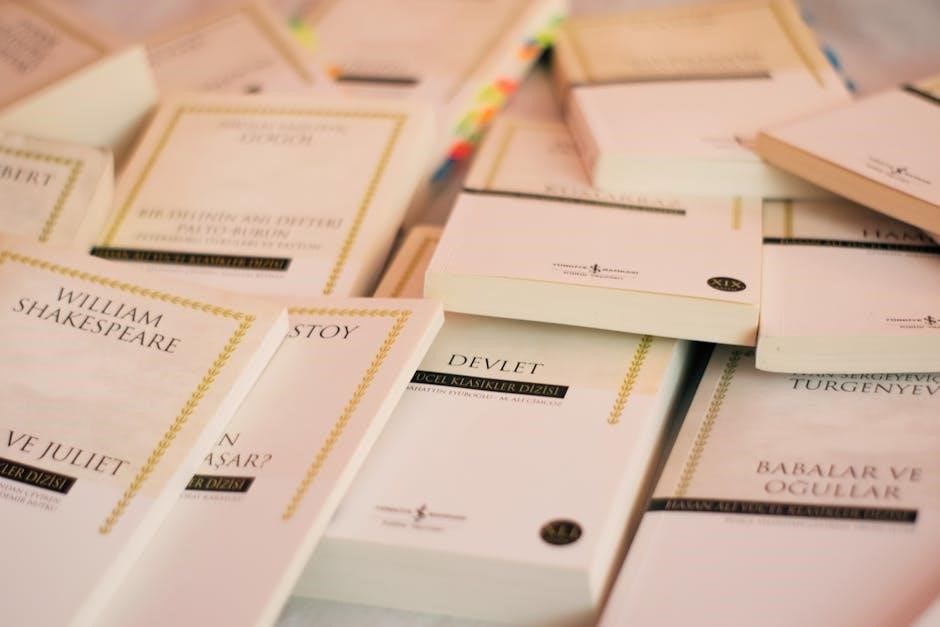romeo and juliet act iii reading and study guide
Dive into Romeo and Juliet Act III with our comprehensive study guide. Scene-by-scene analysis, key quotes, and character insights to deepen your understanding of Shakespeare's masterpiece.
Act III of Romeo and Juliet marks a dramatic escalation of conflicts and emotional turmoil. It introduces pivotal moments that reshape the characters’ fates and deepen the tragic narrative, setting the stage for irreversible consequences.
1.1 Overview of Act III
Act III of Romeo and Juliet is a turning point, filled with intense drama and tragic events. It begins with Mercutio’s death, leading to Romeo’s exile, and escalates Juliet’s emotional turmoil. The act explores themes of fate, love, and conflict, setting the stage for the play’s tragic conclusion. Key scenes, such as the clash between Tybalt and Mercutio, Juliet’s plea to Romeo, and her desperate plan, highlight the characters’ struggles and the inevitable consequences of their actions, deepening the play’s emotional and dramatic impact.
1.2 Key Themes in Act III
Act III delves into profound themes, including fate vs. free will, as characters face irreversible consequences. Love vs. hate is central, with Romeo avenging Mercutio and Juliet defying her family. The motif of light and darkness symbolizes hope and despair, reflecting Juliet’s longing for Romeo amid tragedy. These themes underscore the tragic inevitability of the characters’ choices, highlighting Shakespeare’s exploration of human emotion and destiny, making Act III a pivotal and emotionally charged segment of the play.

Key Scenes in Act III

Act III features pivotal moments like Mercutio and Tybalt’s duel, Juliet’s anguish over Romeo’s banishment, and her desperate plan to escape fate, driving the tragic narrative forward.
2.1 Scene I: The Fight Between Mercutio and Tybalt
In this scene, Mercutio and Tybalt engage in a fierce duel. Mercutio, defending Romeo’s honor, challenges Tybalt but is fatally wounded. Romeo, filled with grief and anger, avenges Mercutio by killing Tybalt. This act leads to Romeo’s banishment from Verona, escalating the tragic conflict and deepening the feud between the Montagues and Capulets. The loss of Mercutio also removes a key figure who brought humor and lightness to the play, intensifying the somber tone of the narrative.
2.2 Scene II: Juliet’s Reaction to Romeo’s Banishment
Juliet learns of Romeo’s banishment and is overcome with grief and desperation. She feels isolated, as her parents insist on her marrying Paris, unaware of her secret marriage to Romeo. Juliet’s emotional turmoil deepens as she realizes the impossibility of her situation. Her determination to reunite with Romeo intensifies, showcasing her growth from a naive girl to a resolute individual willing to defy societal expectations for love.
2.3 Scene III: Romeo and Juliet’s Secret Meeting
Romeo and Juliet share a brief, passionate reunion in Juliet’s chamber, stolen moments before Romeo’s exile. Their love remains strong, but the reality of their situation looms large. Juliet pleads for Romeo to stay longer, clinging to the hope of a future together. The scene underscores the intensity of their bond and the desperation that drives them, highlighting the tragic inevitability of their circumstances. This meeting serves as a poignant reminder of their enduring love amidst chaos.
2.4 Scene IV: Lord Capulet’s Decision to Marry Juliet to Paris
Lord Capulet arranges Juliet’s marriage to Paris, believing it will secure her future and strengthen family ties. Unaware of Juliet’s secret marriage to Romeo, he insists on the union, displaying his authoritarian nature. Juliet’s distress grows as she faces the impossible choice between obeying her father and remaining loyal to Romeo. This decision escalates the conflict, pushing Juliet toward desperate measures and further entangling the tragic events unfolding around her.
2.5 Scene V: Juliet’s Desperation and Plan
Juliet, overwhelmed by her father’s insistence to marry Paris, turns to the Nurse for advice. When the Nurse suggests she should marry Paris, Juliet feels betrayed and isolated. Desperate to avoid the marriage and remain loyal to Romeo, Juliet devises a risky plan: she will fake her own death using a potion to escape her arranged marriage. This bold decision highlights her determination and the escalating tension, as she takes control of her fate with uncertain consequences.
Character Analysis in Act III
Act III delves into the emotional transformation of Romeo and Juliet, showcasing their growth, desperation, and determination. Mercutio’s death and Tybalt’s pride escalate the tragic conflict, revealing deeper character motivations and intensifying the play’s emotional stakes.
3.1 Romeo’s Emotional Struggle and Actions
Romeo’s actions in Act III are driven by intense emotion, from refusing to fight Tybalt to killing him in rage. His banishment from Verona deepens his despair, yet he risks everything to be with Juliet, showing his unwavering love despite the consequences. His decisions highlight a tragic mix of loyalty, impulsiveness, and devotion, ultimately sealing his fate and intensifying the play’s dramatic tension.
3.2 Juliet’s Growth and Determination
Juliet’s character evolves significantly in Act III, showcasing her determination and maturity. Devastated by Romeo’s banishment, she defies her family’s wishes and devises a daring plan to reunite with him. Her resolve strengthens as she confronts societal expectations, demonstrating a shift from dependence to self-reliance. Juliet’s willingness to risk everything for love highlights her growth into a strong, decisive individual, ready to challenge fate and take control of her destiny.
3.3 The Role of Mercutio and Tybalt
Mercutio and Tybalt play pivotal roles in Act III, driving the plot’s tragic momentum. Mercutio’s fiery temperament and loyalty to Romeo lead to his fatal confrontation with Tybalt, sparking a chain of devastating events. Tybalt, driven by hatred for the Montagues, orchestrates the conflict that results in Mercutio’s death. Their actions highlight the destructive nature of vendetta, accelerating the play’s downward spiral and reshaping the characters’ destinies, ultimately contributing to the heart-wrenching conclusion. Their rivalry underscores the futility of prolonged feuds.
Themes and Motifs in Act III
Themes in Act III include fate vs. free will, love vs. hate, and the motif of light and darkness, which symbolize the tragic events and emotional struggles unfolding.
4.1 The Theme of Fate vs. Free Will
The theme of fate vs. free will is central in Act III, as characters confront decisions that seem predetermined yet influenced by personal choices. Romeo’s refusal to fight Tybalt, driven by loyalty to Juliet, highlights the clash between fate and free will. His subsequent banishment and Tybalt’s death illustrate how actions, though seemingly within control, lead to inevitable tragedy, emphasizing the interplay between destiny and personal agency.
4.2 The Theme of Love vs. Hate

Act III vividly explores the contrasting themes of love and hate, central to the play’s emotional core. While Romeo and Juliet’s bond symbolizes the transformative power of love, the deadly feud between their families exemplifies the destructive force of hate. The tragic events, such as Mercutio’s death and Romeo’s banishment, intensify the conflict, illustrating how hate escalates violence and suffering, while love, though redemptive, becomes overwhelmed by the surrounding hostility.
4.3 The Motif of Light and Darkness
Light and darkness serve as symbolic motifs in Act III, reflecting the characters’ emotions and the unfolding drama. Light often represents hope, purity, and love, as seen in Romeo and Juliet’s clandestine meetings. Conversely, darkness signifies impending doom, violence, and despair, evident in the lethal confrontation between Mercutio and Tybalt. This contrast underscores the tragic tension, highlighting the struggle between the lovers’ radiant bond and the shadow of fate that looms over them, foreshadowing the inevitable tragic outcome.

Literary Devices in Act III
Shakespeare employs foreshadowing, imagery, and dramatic irony to heighten tension and tragic elements. These devices emphasize the inevitable conflict and emotional depth of the unfolding narrative.
5.1 Foreshadowing
Foreshadowing in Act III intensifies the tragic tone, hinting at the inevitable doom of the lovers. Mercutio’s death and Romeo’s banishment create an ominous tone, signaling future heartbreak. Juliet’s desperation and plan to fake her death foreshadow the ultimate tragic consequences. Shakespeare’s use of dramatic irony, such as Juliet’s parents’ joyful plans for her wedding, contrasts with her secret despair, further emphasizing the impending catastrophe. These elements engage the audience and deepen the emotional impact of the unfolding narrative.
5.2 Imagery and Symbolism
Shakespeare employs vivid imagery and symbolism in Act III to enrich the narrative. Light and darkness symbolize love and conflict, with Romeo often describing Juliet as a radiant light. The dagger “stuck in his mind” symbolizes Mercutio’s death and Romeo’s guilt. Juliet’s potion and fake death represent her desperate attempt to escape fate, blending illusion with reality. These elements create a powerful emotional landscape, reinforcing the tragic themes and deepening the audience’s connection to the characters’ struggles. Imagery and symbolism amplify the play’s dramatic tension and thematic depth.
5.3 Dramatic Irony
Dramatic irony in Act III heightens tension as the audience anticipates tragic outcomes unknown to the characters. Juliet’s fake death, for instance, creates irony since the audience knows she’s alive, but Romeo and her family do not. This misunderstanding leads to Romeo’s suicide and Juliet’s subsequent grief. Another example is Romeo’s decision to kill himself in Juliet’s tomb, unaware she plans to escape. These moments emphasize the inevitability of the tragic ending and deepen the emotional impact of the play’s devastating conclusion. Shakespeare masterfully uses dramatic irony to engage and unsettle the audience.

Study Guide Questions
This section provides questions to deepen understanding of Act III, focusing on plot twists, character motivations, and thematic elements to enhance analysis and critical thinking.
6.1 Plot-Based Questions
- Why does Romeo refuse to fight Tybalt, and what consequences does this decision have?
- How does Mercutio’s death affect Romeo, and what actions does it provoke?
- What leads to Romeo’s banishment from Verona, and how does this impact Juliet?
- How does Juliet react to the news of Romeo’s banishment?
- What plan does Juliet devise to avoid marrying Paris, and why is it risky?
These questions help students analyze the key events and their repercussions in Act III.
6.2 Character-Based Questions
- How does Romeo’s emotional state change throughout Act III, and what triggers these shifts?
- What motivates Juliet to defy her parents and pursue her love for Romeo?
- In what ways does Mercutio’s personality influence the conflict in Act III?
- How does Tybalt’s hatred for Romeo drive the plot forward?
- What role does Friar Laurence play in Juliet’s decisions, and how does his advice impact her?
These questions explore character motivations and development, essential for understanding their roles in the tragic events of Act III.
6.3 Theme-Based Questions
- How does Shakespeare portray the theme of fate vs. free will in Act III, particularly through Romeo’s actions?
- What role does the theme of love vs. hate play in the conflict between Romeo and Tybalt?
- How does Juliet’s decision to defy her parents reflect the theme of individual choice vs. societal expectations?
- In what ways does the motif of light and darkness symbolize the characters’ emotional states?
- How does the theme of loyalty impact the relationships between characters in Act III?
These questions guide analysis of the themes that drive the tragic events and character decisions in Act III.
Act III of Romeo and Juliet is pivotal, escalating tragic events and deepening emotional conflicts. It underscores themes of fate, love, and loyalty, setting the stage for the play’s heartbreaking conclusion.

7.1 Summary of Act III
Act III of Romeo and Juliet is a turning point, filled with escalating conflicts and emotional intensity. The fatal fight between Mercutio and Tybalt leads to Romeo’s banishment, while Juliet faces her family’s insistence on marrying Paris. Her desperation grows, prompting a risky plan to escape her fate. These events intensify the tragic momentum, deepening the emotional stakes and setting the stage for the devastating conclusion of the play.
7.2 Importance of Act III in the Play
Act III is pivotal in Romeo and Juliet, as it escalates the conflict and sets the tragic course of events. The deaths of Mercutio and Tybalt, Romeo’s banishment, and Juliet’s desperate decisions intensify the emotional stakes. This act deepens the exploration of fate, love, and family feuds, while accelerating the play’s progression toward its devastating conclusion. It serves as the catalyst for the characters’ ultimate demise, making it a cornerstone of the play’s dramatic structure and thematic depth.

